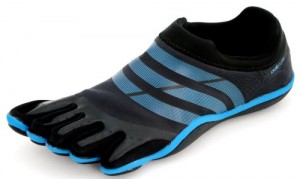 Top Class Action Lawsuits
Top Class Action Lawsuits
Barefoot Blues? Adidas is facing a potential consumer fraud class action lawsuit. Filed this week, the lawsuit alleges that Adidas adiPure training shoes, which capitalize on the “barefoot running” fitness craze, are falsely marketed.
Filed by plaintiff Joseph Rocco, from New York, the adiPure class action lawsuit claims Rocco bought a $90 pair of adiPure shoes that did not deliver the increased training efficiency and decreased risk of injury promised in advertisements.
Instead, the lawsuit claims, the shoes actually increase the risk for bruising and foot damage, due to their decreased padding and other structural differences from more traditional running shoes, the lawsuit states. Rocco said he and other customers were never warned about the potential hazards and that, as a result, he suffered compound fractures after training in the shoes. Yikes!
The lawsuit seeks to certify a class of everyone who purchased adiPure shoes since they were launched in August 2011. Rocco is seeking a refund for the shoes, as well as statutory damages.
Password Compromised? LinkedIn Corp is facing an internet privacy class action lawsuit resulting from a recent hacking that compromised some 6.5 million registered users’ passwords, which reportedly is less than 5 percent of LinkedIn’s user base.
The LinkedIn lawsuit was filed by Katie Szpyrka, who has been a registered account holder with LinkedIn since 2010, and who paid $26.95 per month to upgrade to a “premium” LinkedIn account.
The lawsuit claims LinkedIn “failed to properly safeguard its users’ digitally stored personally identifiable information including email addresses, passwords, and login credentials.” The lawsuit also states, “Through its Privacy Policy, LinkedIn promises its users that ‘all information that [they] provide [to LinkedIn] will be protected with industry standard protocols and technology. In direct contradiction to this promise, LinkedIn failed to comply with basic industry standards by maintaining millions of users’ PII in its servers’ databases in a weak encryption format, and without implementing other crucial security measures.” This, the suit alleges, is in violation of the company’s user agreement and privacy policy.
Top Settlements
Paxil False Advertising Settlement. Were you adversely affected by Paxil? A preliminary settlement has been reached in a Paxil class action lawsuit, and if approved, will provide money to California residents who were 18 years old or older and who paid for any portion of the price of the prescription antidepressant while living in California from January 14, 1999 through January 1, 2003, and who qualify under the settlement (these people are called “Class Members”).
If you’re included, you may ask for a payment, or you can exclude yourself from, or object to, the settlement. The Superior Court for the State of California will have a hearing to decide whether to approve the settlement so that payments can be issued.
The lawsuit claims that GlaxoSmithKline falsely advertised and promoted Paxil as being non-habit forming or non-addictive and that GlaxoSmithKline’s advertisements and promotional materials failed to disclose the risk of symptoms from stopping or discontinuing Paxil. GlaxoSmithKline denies each of these allegations.
What Can I Get from the Paxil Settlement?
The Paxil settlement provides monetary compensation as follows: a full refund of the actual Out-of-Pocket Expenses of claimants who purchased Paxil during the Class Period and who have valid documentary Proof of Purchase, provided that the total amount of payments to claimants with documented Proof of Purchase cannot exceed $8,500,000.00.
For claimants without Proof of Purchase, GlaxoSmithKline shall pay actual Out-of-Pocket Expenses up to $80.00 per claimant, provided that the total amount paid to claimants without Proof of Purchase cannot exceed $500,000.00. GlaxoSmithKline will also: (1) make a charitable contribution of $1,000,000.00 to be shared equally by four California mental health charities; (2) agree to certain limits on any future advertising for Paxil; and (3) include certain information about Paxil on its corporate website.
How Can I File a Paxil Settlement Claim?
You must complete the Claim Form, which you can obtain at CApaxilclassaction.com, and mail it no later than October 10, 2012 to the address on the form. Whether you receive a payment and the amount you get depends on whether you have a valid claim, how much Paxil you paid for, whether or not you have valid Proof of Purchase, and how many valid claims are filed.
How to Opt Out of or Object to the Paxil Settlement
If you don’t want a payment from the Paxil settlement, or if you don’t want to be legally bound by the settlement, you must exclude yourself by October 10, 2012, or you won’t be able to sue, or continue to sue, GlaxoSmithKline about the legal claims in this case. If you exclude yourself, you cannot get a payment from this settlement. If you stay in the settlement, you may choose to object to it, if you do so by October 10, 2012. You may both object and still participate in the settlement and receive money. The detailed notice explains how to exclude yourself or object.
The Court will hold a hearing in this case, called Grair, et al. v. GlaxoSmithKline, Inc., Case No. BC 288536, to consider whether to approve the settlement and a request by the lawyers representing the Class for fees and expenses. You may ask to appear and speak at the hearing, but you don’t have to.
For more information, go to A detailed notice is available at CApaxilclassaction.com or write to the Paxil Settlement Administratorc/o GCG, P.O. Box 9839Dublin, OH 43017-5739.
Ok –That’s a wrap. See you at the bar!

